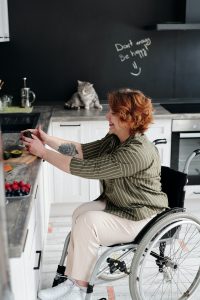Regelmäßige Verben im Präsens – Present Tense Regular Verbs
Verbs are used to describe actions. The present tense is used to describe actions that are going on right now or events that regularly happen.
| Die Frau macht Kaffee für ihre Mitbewohner. | The woman makes coffee for her room mates. |
| Sie trinken jeden Tag fast zwei Liter. | They drink almost two liters every day. |
Unlike English, German does not use a different form of the verb to describe events that are in progress right now (present progressive in English: The donkey is sitting at the table) and events that happen regularly (present tense in English: He sits at the table every morning.).
| Der Junge singt. | The boy is singing/sings/does sing. |
| Er repariert die Wände im Bad. | He is repairing the walls in the bathroom. |
| Der Mann kommt nach Hause. | The man comes home. |
| Er geht in die Küche; er sucht die Katze. | He goes into the kitchen; he is looking for the cat. |


Verb conjugations – regular verbs
In the present tense, verbs can be either regular or irregular (just to keep you on your toes, some verbs may be irregular in the present tense but not in the past, others may be irregular in the past tense but not in the present). Regular verbs add endings to the stem of the verb, irregular verbs add endings and change the vowel of the stem.
Regular verbs
The verb stem (= the infinitive of the verb, minus the suffix -en) of regular verbs stays intact and you can add the personal endings to this stem.
| spielen • play | |
| ich spiele | wir spielen |
| du spielst | ihr spielt |
| er/sie/es spielt | sie spielen |
If the stem ends in d or t, you add an extra -e before some endings:
| arbeiten • work | |
| ich arbeite | wir arbeiten |
| du arbeitest | ihr arbeitet |
| er/sie/es arbeitet | sie arbeiten |
| finden • find | |
| ich finde | wir finden |
| du findest | ihr findet |
| er/sie/es findet | sie finden |
| die Kinder | Warum spielst du mit diesen Kindern? | Why are you playing with these children? |
| das Mädchen | Ich spiele nicht. Ich arbeite. | I am not playing. I am working. |
| der Student | Warum studierst du in München? | Why do you study in Munich |
| die Studentin | Ich finde die Stadt schön! | I find the city nice! |
| der Junge | Ich nicht! | Well, I don’t! |
| die Studentin | Gut für dich! | Good for you! |
When you are talking formally, with adults you don’t know, you need to use Sie. With Sie you need to use verbs in the same form as the third person plural:
| die Studentin | Guten Tag! | Hello! |
| der Beamter | Wie kann ich Ihnen helfen? | How can I help you? |
| die Studentin | Ich muss mich anmelden. | I have to register. |
| der Beamter | Wie heißen Sie und woher kommen Sie? | What is your name and where are you from? |
| die Studentin | Maria Müller und ich komme aus Hamburg. | Maria Müller and I am from Hamburg. |
| der Beamte | Und wo wohnen Sie? | And where do you live? |
| die Frau | Ich wohne in Berlin | I live in Berlin. |

